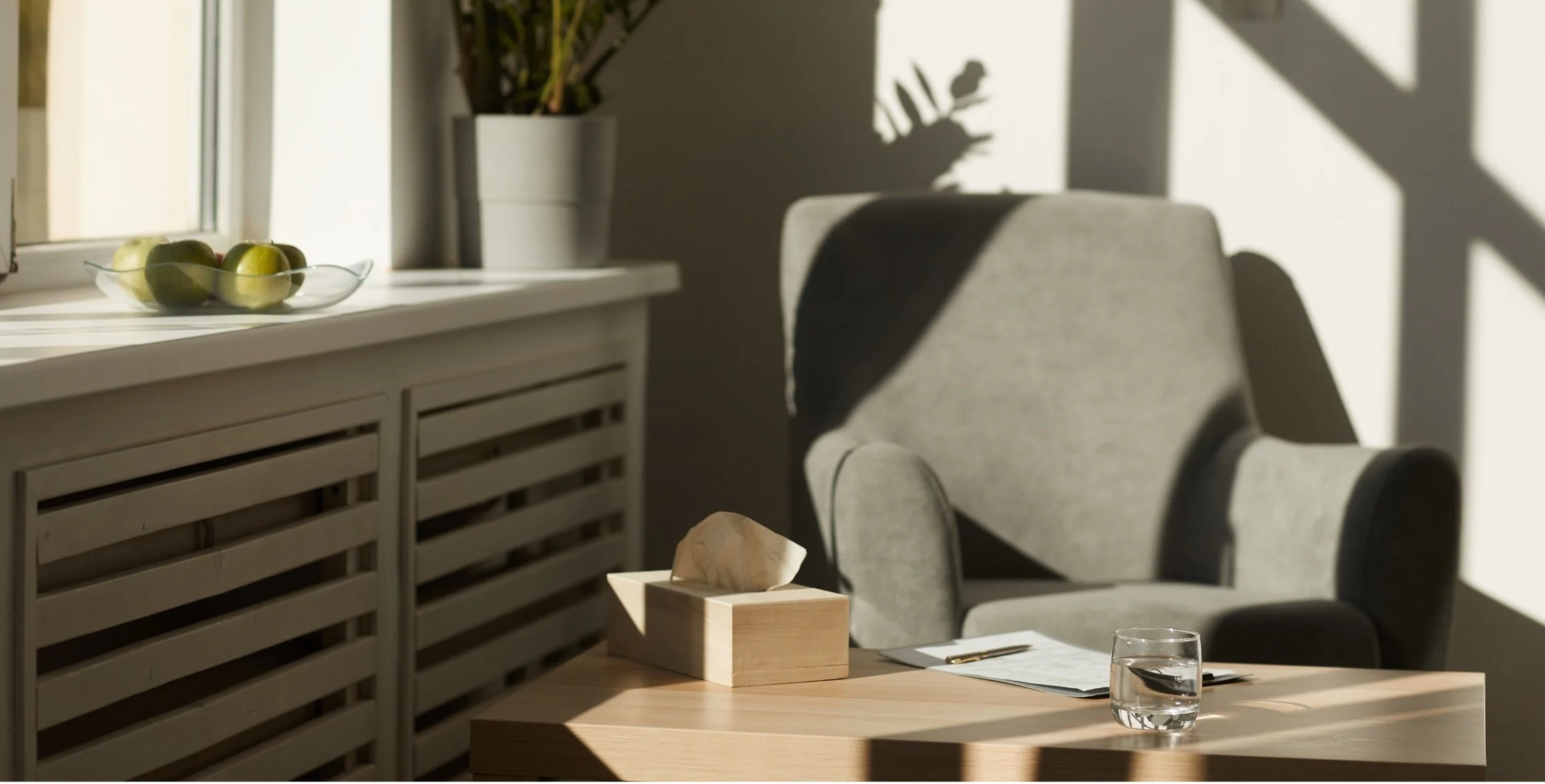Take the First Step: How to Prepare for Your First Counselling Session
Taking the first step into counselling can be one of the most powerful choices you make for yourself. You may wonder what to expect and be a bit nervous, curious or even doubt you have made the right decision. Whether you're feeling a little nervous or simply curious about what to expect, this guide is here to help you feel more prepared and supported as you start your journey. It’s important to remember that it’s completely normal to feel nervous, scared, excited, or even ambivalent about starting counselling. It’s perfectly normal and to be expected, as you’re starting a journey into the unknown. A little preparation can help you for your first session.
What to Expect from Your First Session
I remember walking through the door to my first counselling session with my heart racing, feeling like a failure and nervous that she’d tell me I didn’t deserve to be there. That didn’t happen! However, those first steps into the room felt incredibly difficult. Its still one of the best things I’ve done for my wellbeing. But I’m jumping ahead.
The first thing to note before anything else is that counselling is totally confidential. No one else needs to know you are there and they definitely will not find out what you’ve said. Its not often you get to talk to someone exclusively about you, and know you can say pretty much anything and no one will ever find out. Its your space and your counsellor is there entirely for you. Its a rare experience in today’s world to have an hour a week set aside just for you with no other demands. Although clearly it can be demanding being there.
The counsellor is there to help you. If you don’t know where to start don’t worry. The first session of counselling is for you to learn a bit more about your counsellor, and for them to find out about what brings you to the room. We call it ‘the room’ and its all yours for your sessions as a safe and confidential space.
The first meeting helps set the stage for what’s to come: you’ll discuss how the process works, share what you hope to achieve, and cover practical details — much like when you visit a new doctor for the first time. Its also a chance to make sure you can work together, that your reasons for there can be met and you feel comfortable with your counsellors approach.
They will help by asking questions about your life, health, medications and whether you’ve experienced counselling before. They will ask what you want to achieve. Don’t worry its not a test! They’re building a picture of you as well and want you to feel at ease. You may be asked to sign an agreement, which is perfectly normal. This is very normal and helps sets out the parameters of working together and can reassure you that this is more than just chatting with a friend.
Practical Tips to Prepare
It can feel hard to open up to a stranger and let them hear what you may consider your personal thoughts. Or it may be that you’ve held things so long you just want to get them out there, but then it all wants to hurtle out in one big monologue with no room to breathe. There are no hard and fast rules or a right way to do this. This after all is your very own journey. Here are some practical tips though to help you prepare for the first session:
Think about what you'd like to talk about: No need to plan it all, but jotting a few points can help. You will have plenty of time to go into all the detail in other sessions. This isn’t a test and you will not fail. Be gentle with yourself and just give a flavour to begin with.
Arrive a little early: Give yourself time to settle (especially if it's an unfamiliar location or online platform). I can self-sabotage by being late for things, which then stresses me out so I’m learning to manage my time better! Sometimes there isn’t a waiting room for your counsellor. However you can still make sure you know where you need to be and take a few minutes before heading in and remember to breathe.
Be honest: Even if it feels awkward — openness helps the process. Counselling is one of those places where honesty truly matters. It can feel awkward sometimes if we’ve had to hold things in. Give yourself time to build trust in your counsellor, and test being honest with them. Remember – they work for you and if you don’t like something, tell them!
Manage your expectations: It’s absolutely fine if it takes a few sessions to feel fully comfortable. This is a first session and it may take time to build trust, find the words you want or fully engage in the process. Your counsellor is there to help you and never judges you – they want the best for you.
I’d also add that its absolutely OK to cry, laugh, be silent, be angry or feel numb – any emotion is welcome. I know when I first went to a counsellor I couldn’t stop crying from the nerves and from letting out the things I’d been holding. I felt so embarrassed, however, my counsellor helped me realise it was fine and perfectly normal. I could cry all I needed to.
Questions You Might Want to Ask
A first counselling session isn’t just about you talking about why you want to be there. Its a chance for you to find out a bit about your counsellor and how things will work. You need to feel comfortable and safe with your counsellor and this is your chance to start working out if they are right for you. Asking questions is a great way to understand what’s going to happen. Things like:
How long will the sessions last?
Every counsellor will have a slightly different approach. You’ve taken the big step and now you need to know how long each session might be, how many sessions you are allocated and how much they might cost. This will help you make sure the counsellor fits with your schedule and you can commit to it all.
What type of counselling approach do you use?
There are many different approaches to counselling – and you most definitely do not need to know about them before going in! However you will want to know what’s expected of you and how your counsellor will work with you to achieve your aims. Does this feel comfortable to you – although remember some discomfort will be required during the process as talking about you may feel hard. What you really want to know is – is your counsellor qualified to work with you and do you feel you can work with them.
How often will we meet?
Its important to know how often you’ll be working together. Counselling sessions can be weekly, fortnightly or biweekly or even monthly, although this is more unusual. Usually you will be offered a weekly slot at the same time and place. Consistency is an important part of your work together and can help you feel safe in the work. Its a professional arrangement and should feel like that.
What happens if I miss a session?
Life and illness happens. Its important to know what the counsellors cancellation policy is, and how this might affect charges for sessions. Some counsellors will want more than a weeks notice for cancellations and will charge for the session after this, while others will only want 24 hours before they charge. Others may be more flexible. Its good to know up front what their policy is and how this fits with you and your life.
Remember: It’s Your Space
A key thing to remember at your first, and subsequent sessions, is that you are in control of what you share, and when you share it. There are no rules. Sometimes you may be offered counselling through work or a Doctors surgery and you may only be offered 6 sessions. This isn’t long and its fine not to share everything if you don’t feel safe or ready to do so.
Working with your counsellor in the first session to discuss your goals and what’s possible is a chance for you to work out how you want to progress. And what progress actually means! You control how far you want to go, how fast and what progress means to you.
The wonderful thing about counselling is that this really is an opportunity to talk and be heard properly, maybe for the first time. In a world where there is so much noise and bustle it can be hard to find a moment for you and counselling can be just that. A moment to really be heard and listened to, a moment to reflect on you and your experience and do so with someone who isn’t interrogating you or wanting to talk about themselves. Counselling is a collaboration, a chance for another human being to sit with you and take those steps together in a safe warm and respectful space. Its your time, and space and the first session is a time to check out how that feels for you.
Final Thoughts
Taking that first step into a counselling room is a huge achievement. Hopefully this has helped to give you some reassurance about what might be expected of you, what’s normal and what might help. Hopefully the first session will ease you into a comfortable, safe, welcoming relationship and with someone you feel you can trust to be on your journey with you. Remember its your journey and your sessions and its OK to be nervous. Remember, taking that first step is an act of courage. Whatever emotions arise, they're part of the process — and you're never alone in this journey.
If you are considering face to face counselling in the Exeter and Exmouth area in Devon and want a welcoming space with someone to start your journey you can get in touch with me here. If you live elsewhere I do offer online counselling using platforms like Zoom so drop me a message and we can chat options through.




